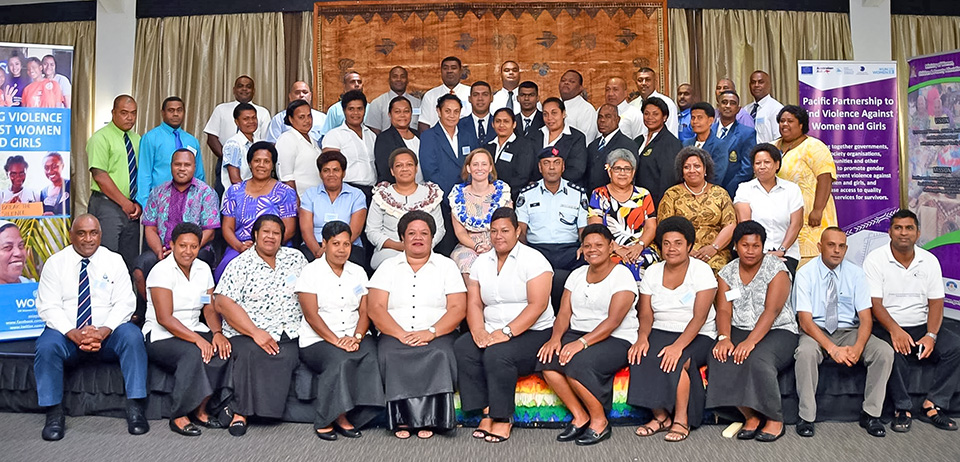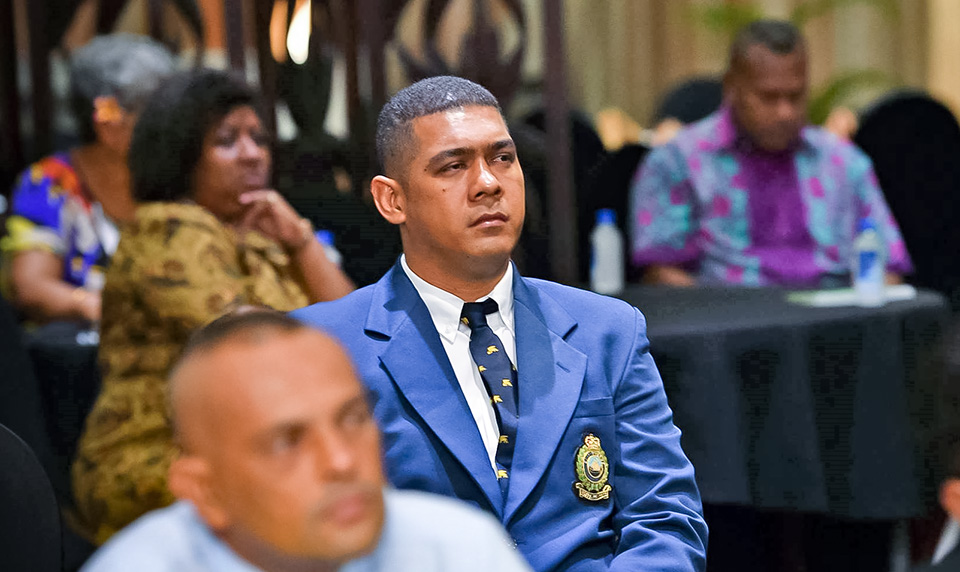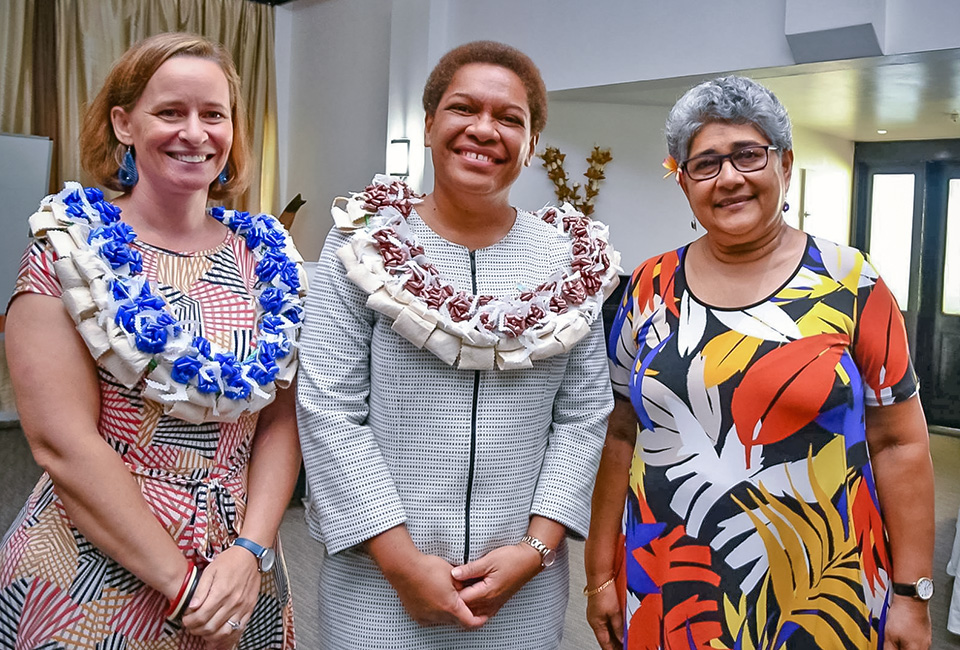Support for Police to Improve Outcomes for Domestic Violence Survivors
Date:
[Joint Press Release]

Coral Coast, Fiji — Police officers are being supported to help improve services and processes when responding to survivors of violence who are mostly women.

Police deal daily with cases of domestic violence and other gender-based violence cases. Therefore, this training is aimed at helping police officers increase their knowledge and improve their understanding of gender, human rights, violence against women and girls and, in doing so, improve their skills to sensitively and professionally respond to female survivors who report gender-based violence.
Providing police with information about the importance of a survivor-centred response, and about the National Service Delivery Protocol for Responding to Cases of Gender Based Violence, is central to this week’s Best Practices for Police Response to Domestic Violence: Understanding the Law, Practice and using a Survivor-Centred Approach training, being held at the Warwick Fiji Resort, from the 4th to the 8thof February.The training, organized by the Ministry for Women, Children and Poverty Alleviation is being held in partnership with the Fiji Women’s Crisis Centre (FWCC) and UN Women Fiji Multi-Country Office (MCO), which is providing technical training and funding support through the Pacific Partnership to End Violence Against Women and Girls (Pacific Partnership). The EUR19.5million Pacific Partnership programme is funded by the European Union and Australian Government with cost-sharing from UN Women.
The Minister for Women, Children & Poverty Alleviation, Hon. Mereseini Vuniwaqa, said that most women who experience domestic violence don’t report it as they fear losing access to their children, home and community and, if a survivor of violence does report it’s most commonly via their local police – so it’s critical that we support members of the Fiji Police Force to understand laws and commitments in treating survivors respectfully.

“This training will contribute to a wider understanding of the laws and regulations that deal with domestic violence, which is an area that Fiji Police Force officers are dealing with in their daily work. It will also give prominence to the National Service Delivery Protocol and how it can help police officers to support survivors of domestic violence better and contribute to overall reduction in family violence in Fiji,” said Hon. Vuniwaqa.The Service Delivery Protocol commits the Fiji Police Force, Judicial Department, Legal Aid Commission, civil society frontline services, Ministry of Women, Children and Poverty Alleviation, Ministry of iTaukei Affairs, Ministry of Health and Medical Services, to better coordinate their services to ensure survivors of gender-based violence receive quality, timely support. It was launched in 2018 by Ministry of Women, Children and Poverty Alleviation and developed by the National Taskforce on the National Elimination of Violence against Women, is an important component of the training.
Hon. Vuniwaqa also said that the Fijian Government in its pledge to eliminate violence against women has made commitments at various levels that can help us change the way our women are treated. She added that the National Development Plan places priority on empowering women to reach their full development potential and its commitment in providing positive and innovative approaches to achieving, gender equality and to eliminating discrimination and violence against women, promoting gender-based violence prevention.
"Fiji is equipped with the Domestic Violence Act to ensure justice and safety is given priority in cases of violence within homes and also the National Gender Policy, which defines gender-based violence and demands the commitment of stakeholders in this area, amongst several other aspects of women’s development to ensure women live a life free from violence and discrimination,” she said.
Coordinator of the Fiji Women’s Crisis Centre (FWCC), Shamima Ali, explained that the police have a critical role in ensuring laws are enforced, and in helping to coordinate government and other services to ensure better access to support women, girls and child abuse survivors.
“Last year’s launch of the Service Delivery Protocol really binds our services together by clarifying good practices and exactly what each of our services offer, including police, to ensure laws are enforced and that survivors are treated with the dignity, respect and care they deserve,” Ms. Ali said.
“In the past, a common habit for police, health and other officers was to try and help survivors of domestic violence to return to the perpetrator, often her husband, ‘to keep the family together’ but we know from research that doesn’t stop the violence and can have very harmful impacts on the family,” said Ms. Ali.
“The best way to end violence against women and girls is to ensure our laws are enforced so there is zero tolerance for the horrendous crime of domestic violence, and to provide access to quality support services for survivors to help them recover.”

Speaking at the opening of the weeklong workshop, Sarah Boxall, Deputy Representative of UN Women Fiji Multi-Country Office (MCO) highlighted the importance of the workshop in ensuring frontline police understand the importance of a survivor-centred approach when implementing Fiji’s laws and the Service Delivery Protocol’s multi-agency approach.
“We know that how women and girl survivors are treated within the frontline care system, such as at their local Community Police Post, has a great impact – positively or negatively – on their care and healing,” Ms. Boxall said.
“This underscores how critical it is for police, health and medical, legal, crisis centre and other service providers to be operating from the same set of guidelines and principles that promote survivor-centred care and treatment, and in line with national legislation and policies,” she said.
“At a global level, UN Women plays a lead role in supporting national governments to improve the coordination and governance of service delivery, and we’re privileged to work alongside the Government of Fiji and frontline service providers who work tirelessly to support women, children and families to heal and recover from gender-based violence.”
UN Women’s support for this week’s training and the implementation of Fiji’s Service Delivery Protocol and is made possible through the Pacific Partnership to End Violence Against Women and Girls. The Pacific Partnership brings together governments, civil society organisations, communities and other partners to promote gender equality, prevent violence against women and girls (VAWG), and increase access to quality response services for survivors. The EUR 19.5million programme is funded primarily by the European Union (EUR 12.7m) with targeted support from the Australian Government (EUR 6.2m) and cost-sharing from UN Women (EUR 0.6m).
For more information contact:
- Joeli Vueti
Media Liaison Officer, Ministry of Women, Children and Poverty Alleviation,
Phone: 3312199 | Email: joeli.vueti@govnet.gov.fj - Tanya Ali
Publications Officer, Fiji Women’s Crisis Centre
Phone: (+679) 9928031 | Email: tanya@fijiwomen.com - Sarika Chand
Media and Communications Specialist, UN Women Fiji Multi-Country Office,
Phone: (+679) 9239857 | Email: sarika.chand@unwomen.org
BACKGROUND INFORMATION:
Fiji National Service Delivery Protocol for Responding to Cases of Gender Based Violence - Standard Operating Procedures for Interagency Response Among Social Services, Police, Health and Legal/Justice Provider (called the ‘Service Delivery Protocol’): In Fiji, evidence shows that gender-based violence is a serious issue yet there has been a lack of clarity around the standard operating procedures for different government and civil society organisations to best respond to survivors of gender-based violence. The primary purpose of the Interagency Service Delivery Protocol is to outline overall guidelines for standard operating procedures for interagency response to gender-based violence (GBV ). The Protocol ensures the provision of appropriate, timely and quality services for survivors of gender-based violence. The Protocol is a binding agreement for frontline service providers committing them to a common set of principles and guidelines to ensure GBV survivors - most commonly women and girls - receive the best care and treatment from all sectors in a response. Furthermore, it also commits the Fiji Police, the Judiciary and the Office of Public Prosecutions, to play their role in obtaining better justice outcomes and ongoing safety and security for innocent survivors.
Government partners: Ministry of Women, Children & Poverty Alleviation (MWCPA), Ministry of Health and Medical Services, Fiji Police Force, Judicial Department, Legal Aid Commissioner, Ministry of iTaukei Affairs, while service provider partners include: Fiji Women’s Crisis Centre; Medical Services Pacific, Empower Pacific, Homes of Hope and The Salvation Army.
More information is available online (9 July 2018): http://asiapacific.unwomen.org/en/news-and-events/stories/2018/07/preparing-to-better-help-fiji-survivors
Violence against Women and Girls (VAWG): Fiji has twice the global average
Violence against women and girls is recognized worldwide as a social, political, and public health problem as well as a fundamental violation of human rights, with 1 out of every 3 women experiencing physical or sexual violence in their lifetime. In Fiji, 64 per cent of Fijian women (almost 2 in 3) aged 18-49 who have ever been in an intimate relationship experienced physical and/or sexual violence or both by a husband or intimate partner in their lifetime – almost double the global average.
This statistic, coming from the national Violence Against Women (VAW) prevalence study conducted by the Fiji Women’s Crisis Centre (FWCC), published in 2013, highlights the serious and pervasive problem of gender-based violence (GBV). The main forms of violence reported by Fijian women over the course of a lifetime are physical, sexual and emotional abuse by an intimate partner; sexual assault; and sexual harassment. Physical violence is the most widespread over a woman’s lifetime in Fiji, with 61 per cent of all ever-partnered women (more than 3 in 5) experiencing it, compared with 58 per cent experiencing emotional violence and 34 per cent (more than 1 in 3) experiencing sexual violence (FWCC 2013).
Violence against women and girls is a grave violation of human rights
Every woman and girl has the right to live her life without the threat of violence. A survivor of gender-based violence has the right to report the violence to anyone she chooses, and anyone who is approached by a survivor of GBV for assistance should provide objective and comprehensive information to the survivor on services available in the community. In Fiji, the most common first point of referral for cases of gender-based violence is the police.